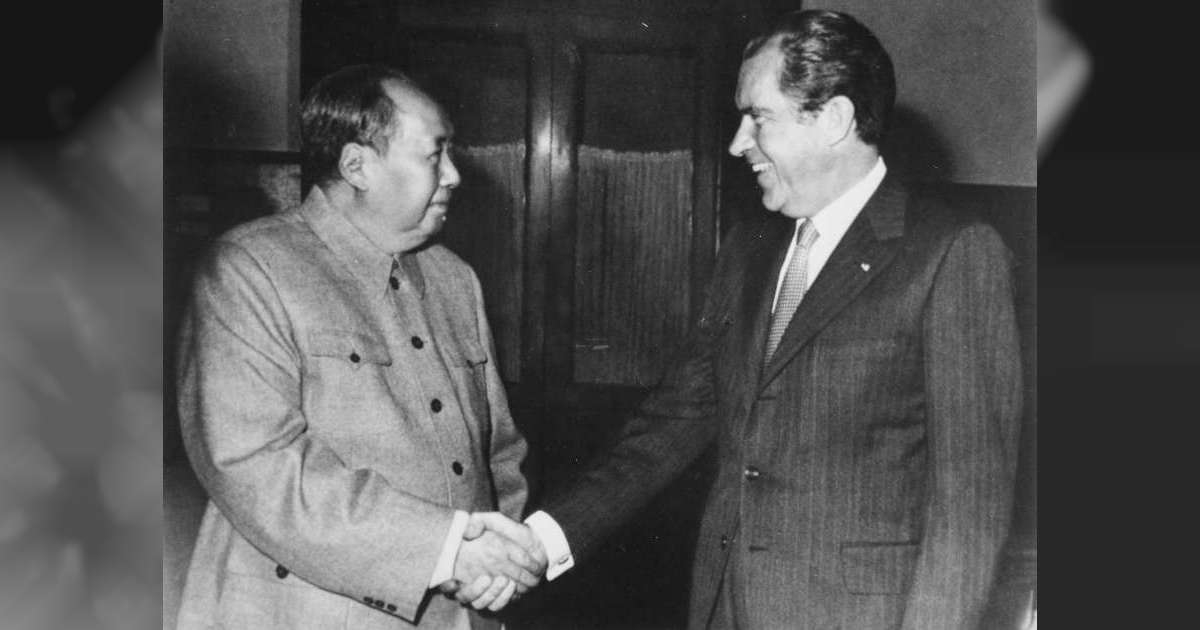
I just saw John Adams' opera about Nixon not China. A work of that magnitude can only be seen at the Teatro Real in Madrid or the Palau de la Música Catalana. Its grandiose staging, its choirs, its instrumentation, required an appropriate building. It took more than thirty years to be seen in Madrid. It premiered in 1987 about events that had occurred in 1972. You can see, you can feel, that the years have passed by the dark circles and bruises. Alice Goodman, an American Jew who chose to be an Anglican priestess, wrote the opera's libretto. She is currently Chaplain of Trinity College in Great Britain. She is married to Geoffrey Hill, an English poet. (Benny Goodman, musician and director of a big jazz band, was also Jewish, and his wife was called Alice, but I think she had nothing to do with this new Alice Goodman, poetess born in 1958).
On February 22, 1972, Nixon is in Peking. Remember that on that day he was born George Washington and sees it as a good omen. But it hides what would be a lead motive of Henry Kissinger, his most important advisor: get the USA out of the European and Asian fold. Essentially, it is the lesson on international politics that George Washington offers in his “Farewell Address” (1796) about the newborn American republic. He had it published in the most important American newspaper of the time, naturally from Philadelphia. We must separate ourselves from Europe's disputes - says GW -. The United States should not get involved in those kinds of bloody incidents. (That's what Henry Kissinger preaches, along with his assessment that there is nothing exceptional about the American future.) Washington dies two and a half years after delivering his “Farewell Address.” He is dedicated, like Cincinato, to his private affairs after the feat of defeating the English.
Zhou Enlai is the Prime Minister when they prepare Richard Nixon's trip to meet with Mao Zedong. Mao speaks like a prophet in apothegms. Zhou is in charge of foreign relations. He says intelligent and intelligible things. Pat Nixon, the wife of the President of the USA, is full of empathy for Chinese women and communicates it in an excellent way. Together they are preparing the betrayal of Taiwan.
In real life, not in opera, the Watergate (1972) and after that scandal the resignation of Nixon (1974), preceded by the handover of the vice presidency (1973). Rule and preside over the country Gerald Ford, former speaker of the Republican Party in the House of Representatives (the only Republican who had ascendancy among the Democratic caucus), constitutional successor to the vice president Spiro T. Agnew (1969-1973), who reached an agreement with his captors over a tax issue of just 29 thousand dollars: he would not run for another electoral position as long as he could opt out of visiting prison. Agnew held Nixon responsible for his suffering and sorrows. According to him, Nixon gave up his head for nothing. Then they asked for theirs and those of other collaborators. Nearly 70 people were charged. 48 were sentenced to prison.
If the opera had been written in the year 2000, it would not bring about the madness of Mao ("The Leap Forward" and, above all, "The Cultural Revolution"), but about the achievements of Deng Xiaoping. All made under an aphorism that implied that Mao's era of voluntarism had ended: "what does it matter if the cat is black or white, as long as it catches mice." Until the 15th century, China had been the first nation on Earth. And he had occupied that enviable position, precisely for that reason: because he faced problems with a vision that was not ideological, but practical. Deng focused on philosophy to solve problems. Hence it is useless to try to find a “model” in the China that appears before history (in our days, of course). They opened the market to the extent that the reform allowed.
Deng fired a poisoned dart at Marxism-Leninism when he said that “getting rich is beautiful.” There is no other way to get rich than with company captains devouring and reinvesting the difference between what things are worth at the bottom of the machine and the retail price, the famous capital gain which, according to Marx, should be assigned to the workers. Only there are subjective factors that do not enter into the equation as the marginalists demonstrated in Marx's own time, starting with William S. Jevons, Carl Menger and León Walrás, up to Eugen Böhn-Barwek who dedicated an entire chapter of his book to him (Capital and Interest, 1884) which Marx could not read because it appeared a year after he died in 1883.
But we live in the age of Xi Jinping and not at the time of Deng Xiaoping (1904-1997), “the architect of modern China,” as his most reverent compatriots call him, who had great press, despite the Tiananmen Square massacre in 1989, where Perhaps thousands of people died, although the government recognizes less than 500. What do Deng and Xi agree on? For now, both are reformists and do not trust Marxism, although they use the Chinese Communist Party. At the meeting that Biden and his Chinese counterpart held in November 2022 It was reaffirmed that there would not be a “Cold War” between the USA and China. Xi went to tell Biden that Russia is throwing in the towel in Ukraine in exchange for internationalizing the sea around the Crimean peninsula. Would the team -John Adams and Alice Goodman- dare to forge a new opera? What changes are the characters that move the threads of the story.
What do you think?
COMMENTFiled in:
opinion article: The statements and opinions expressed in this article are the exclusive responsibility of its author and do not necessarily represent the point of view of CiberCuba.